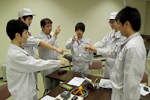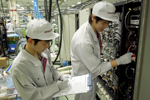 网页内容展示
网页内容展示

Advantest Group Health and Safety Policy
Advantest Group recognizes that Health and Safety (H&S) is one of the important aspects of our business operation. This policy is set forth to ensure every Advantest employee’s Health and Safety.
- Health and Safety First
We will make H&S as the first priority for employees in all Advantest operation groups. - Compliance with Laws and Regulations
Aim to achieve compliance with legal requirements through good occupational health and safety performance. - Regular Review of Health and Safety Compliance
To support this policy we will provide employees with an annual activity plan which will address every business location’s H&S regulations through management support. - Education and Training
Ensure that employees receive appropriate training, and are competent to carry out their designated responsibilities. - Disclosure of Health and Safety
To raise awareness, we will announce our H&S information to all employees publicly.
Promoting occupational health and safety activities


Safety and health education
on work handling high
voltage equipment
At the Advantest Group, annual occupational health and safety plans will be prepared based on the basic policy and systematic health and safety activities will be conducted, mainly by the Safety and Health Committee established at each business site of Advantest Corporation and its affiliates in Japan. In addition, the Safety and Health Committee will inform business sites of problem areas and implement improvements as it works to establish consistent occupational health and safety activities.
Fiscal 2011 served as a preparatory period during which a safety and health training system was created based on the Advantest Group’s basic policy towards occupational health and safety and a review of the training required. These measures were conducted in preparation for the establishment of occupational health and safety plans to be implemented by each Safety and Health Committee from fiscal 2012.
Continuing with the training plan from fiscal 2010, we trained internal instructors and conducted x-ray safety and foreman training. In addition, a factory analysis was conducted in Gunma Factory and Gunma Factory 2 by an external party, based on which safety improvements were conducted in response to risk factors that hadn’t been noticed internally.
In addition to these initiatives, a draft of the Advantest Group’s basic policy toward occupational health and safety, and the Advantest safety and health training system based on the fiscal 2010 training plan, were prepared ahead of fiscal 2012.
During 2012, we will roll out initiatives under this basic policy by steadily implementing the annual plans at each business site. Additionally, in terms of training and drills, we will conduct various training activities in accordance with the Advantest safety and health training system as we strive to attain a safe and comfortable working environment by eliminating the causes of work-related accidents, improving safety levels, and improving the awareness of each and every one of our employees towards safety.
Mental Health
To maintain employee health, it is important for managers to understand mental health issues and make every effort to alleviate employees’ occupational stress to prevent health impairment. Managers also need to know how to identify and address any mental health problems at an early stage for employees that require particular care.
Similarly, each and every staff member needs to deepen their understanding of stress and mental health issues. At Advantest, we believe that lively workplaces are created by lively employees and support is provided mainly by our Health Promotion Office for the physical and mental health of employees to promote a safe, comfortable work environment. Specifically, we conduct training for management posts (follow-up training) on stress and other mental wellbeing issues in the workplace, to promote the prevention and early detection of problems.
During fiscal 2011, mental wellbeing follow-up training was conducted for management posts (including senior leaders) at Advantest Corporation and Group companies in Japan (basic training was conducted in fiscal 2010). The training session was conducted 14 times in total at ten locations across the country between January and March 2012. The total number of participants was 250. Advantest’s own industrial physician delivered the training through case studies based on the theme of creating workplaces that don’t cause mental wellbeing problems among employees and hands-on training conducted through group work. In addition, mental wellbeing training that included self-care topics has been conducted for all employees at regional business sites that don’t have full-time staff members. Moreover, as a first step for a deeper understanding of mental wellbeing, a lecture on self-care was presented at a Group general meeting.
As a result of these measures, the response of managers to employees with mental wellbeing issues has gradually improved. During fiscal 2012, we will conduct training on self-care (the most basic and important form of care for mental wellbeing) for all employees as we strive to progress from early detection to prevention of mental wellbeing issues.
Health care
Since a permanent industrial physician was assigned in 2005, Advantest has gradually established a system for health management support following health examinations. However, we have not been able to provide sufficient support in some aspects due to there being no set method for providing support and no standards for handling data due to factors including changes in the companies that conducted health examinations for us. Due to this issue and other issues such as the difficulty in conducting comparative analysis with past data, it became necessary for us to review the status of health-related measures following health examinations and study how we should approach the future.
In response to these issues, the Advantest health examination judgment criteria were created during fiscal 2011, and initiatives were launched aimed at a 100% health examination receipt rate and a 100% health management support rate after health examinations. With activities focused on the permanent industrial physician at the Gunma R&D Center, we worked together with industrial physicians at regional business locations to provide post-examination support. Of the 1,660 employees subject to health management support, we provided support via e-mail or over the telephone for 448 employees, support through meetings with industrial public health and other nurses for 552 employees, and support through meetings with industrial physicians for 539 employees. As a result, we achieved a health management support rate of 93%.
Out of information related to periodical health examinations and health examinations on life-style related diseases, the Group only manages data on periodical health examinations. In order to use this data more efficiently the Group plans to make improvements by having its industrial physician confirm the results of health examinations on lifestyle-related diseases so that this data can help us manage the health of our employees.

